Prof. Joel Hayward’s website archive
Joel Hayward, ZDaF, BA, MA Hons, PhD, FRSA, FRHistS
Prof. Joel Hayward’s Old Website
Joel Hayward, ZDaF, BA, MA Hons, PhD, FRSA, FRHistS
My overview of "The Canterbury Affair"
Dr Joel Hayward’s Explanation
I am a former student of the University of Canterbury in Christchurch, New Zealand, from which I ultimately graduated on 3 May 1996 with a Doctor of Philosophy (PhD) degree in (military) history.
Back in 1991, immediately following completion of a three-year bachelor of arts degree in history and classics, I enrolled for a two year masterate. During 1991 I wrote my thesis and during 1992 my four taught MA honours papers. On 7 May 1993 I graduated with the degree combining those five components: a masterate in History. I received it with First Class Honours. For the taught papers, worth fifty percent of the overall masterate grade, I gained A-, A, A, A+ (thus, an A average). For the thesis I gained a grade that was totally consistent with this level of accomplishment: A+. The internal examiners for my four Honours papers were Dr Chris Connolly, Dr Ian Catanach, Mr Charles Manning (HoD, Classics), and Dr Trevor Burnard. These grades were confirmed only after the papers, along with my Honours classmates', were sent to the History Department at Otago University for external examination.
The internal examiner for my thesis was Dr Vincent Orange, then a Reader (Associate Professor). The thesis grade was confirmed by the HoD, History, Professor W. David McIntyre, and a small consultative team, after the thesis had been examined by an external examiner, Professor John Jensen of Waikato University.
Thus, the grade of A+ for the thesis was not only of the same level of accomplishment as my four other graduate paper grades; it was also awarded only after it had been examined by an internal examiner as well as an examiner from another university who had not been involved in the research and writing of the thesis, and after the reports and the recommended grades from both examiners had been scrutinised by a small History Department committee presided over by one of New Zealand's most distinguished historians, W. David McIntyre.
I was naturally not involved in, consulted over, or privy to the examination process of either my four Honours papers or my thesis. Only the senior academic experts mentioned above were involved. And I had never met or had any contact with Professor Jensen. The selection of Professor Jensen as independent external examiner was apparently made by Dr Orange in a proper fashion: after taking advice from his HoD, Professor McIntyre. In a handwritten note from Dr Orange to Professor McIntyre on 14 November 1991 — which I recently received anonymously from Wellington — the former asked his distinguished HoD "for advice (eventually) on who could be his [that is, my] external examiner."

The top half of this note won't be posted until I receive permission from Professor McIntyre and Dr Orange to display it. I respect our nation's privacy laws. In any event, the top half merely discusses Dr Orange's leave plans for the following year.
Now, as to the "controversial" topic, my thesis attempted to analyse the phenomenon known as Holocaust revisionism, which I believed I was investigating in an even-handed manner.
I chose this topic because it combined my three great interests: World War II, the German language, and Jewish history. Even before I began my university studies I had gained a strong reading ability in Hebrew, which I studied because of pride in my Jewish heritage on mum's side of the family. My nana, Myrtle Bush, identified herself as Jewish, and my dear mum and I, more so than my two siblings, took an interest in all things Jewish.
As well as learning Hebrew I travelled to the small nation I felt a bond with: Israel, the Jewish homeland. This is a photo of a very young me in Tel Arad, Israel, in 1989 or 1990, the year before I wrote my masters thesis. Notice the menorah (Jewish candlestick) necklace.
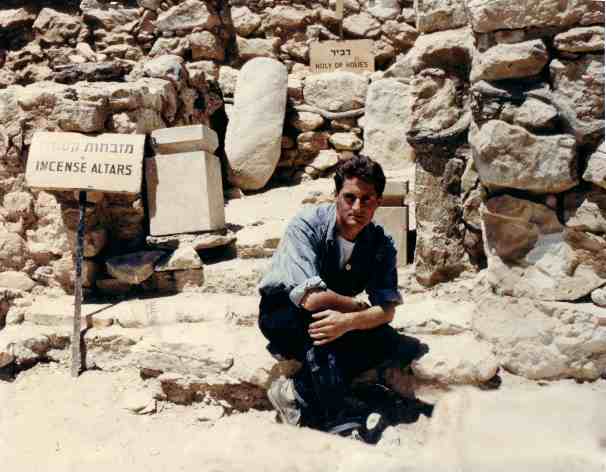
I loved my times in Israel and believe without reservation that, while Palestinian grievances need addressing (and they are a lovely people, like their Israeli Jewish neighbours), Israel is a legitimate state that has given Jews a sense of focus and safety after the horrors of World War II. I have never wavered in this belief. As I said in the 15 April 2002 issue of the Evening Standard: "Israel clearly has a right to exist within its current borders, and its citizens must be able to live in safety."
During the five years up to and including the year I wrote my thesis on revisionism (1991) I was a member of The New Zealand Friends of Israel, Inc., a national non-religious Zionistic group composed of both Christians and Jews. In fact, the very year I wrote the thesis I was a Christchurch branch committee member. I was also a member of a local non-religious philosemitic group called Opposition to Anti-Semitism, Inc.
I thus thought that, with this background and my resolve not to get drawn into the revisionism/anti-revisionism debate, I could write a fair and non-partisan thesis. I certainly tried to do so. In good faith I did my best to acquire and make sense of key sources, to create a balanced argument, and to accept every piece of direction and guidance given by my trusted supervisor, Dr Orange, with whom I met for supervision meetings almost weekly. I can say in truth that I scrupulously accepted all of Dr Orange's instructions and revised my work continuously in accordance with his advice.
My examiners thought I had stayed fair and non-partisan, but in due course others would disagree: emphatically!
The New Zealand Jewish Council would later claim that I relied mainly on revisionist sources and made inadequate efforts to obtain anti-revisionist, or Jewish, sources. I can refute this claim with a clear conscience and plenty of proof.
In 1991 I wrote to dozens of Jewish organisations around the world (all of them thanked in my thesis, pp. i-ii) asking for specific revisionist and anti-revisionist articles that could help me determine whether the revisionists were employing accepted methodological principles. Many were helpful, for which I remain grateful. Here are a few of the many positive responses I received:
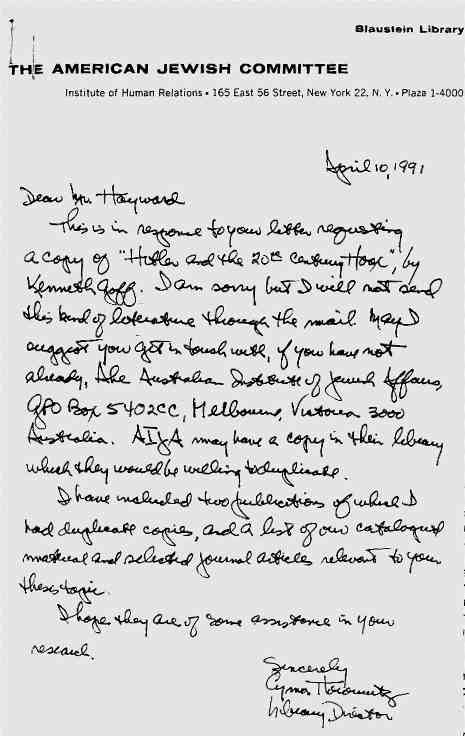
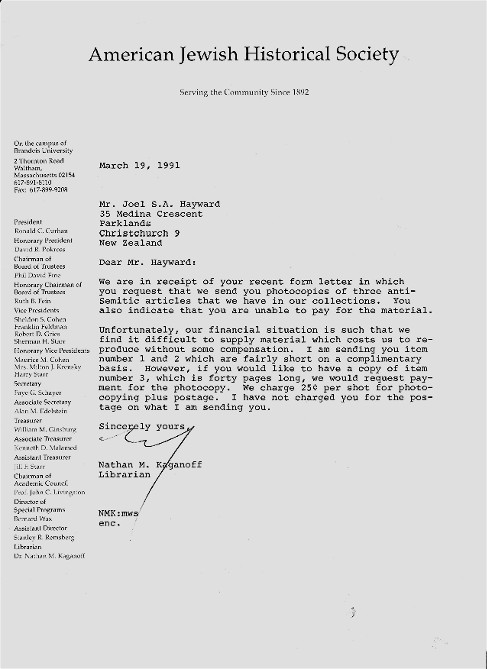
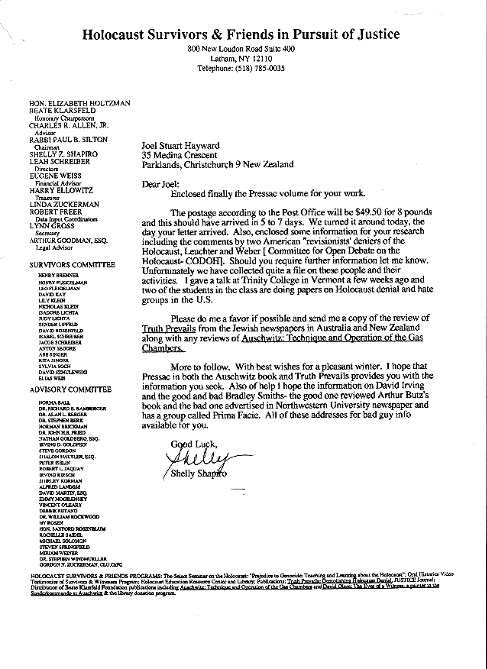
More importantly, I also wrote to the world's leading experts on the Holocaust, including Professors Raul Hilberg and Christopher Browning and Dr Gerald Fleming, and to Professor Deborah Lipstadt, recognised as an expert on Holocaust revisionism, asking for their guidance. I was especially keen to link Adolf Hitler indisputably to the extermination of the Jews, and asked them all for documentary evidence that, in my overly busy academic year, I had possibly overlooked.
For example in my 27 December 1991 letter to Professor Browning, I asked him please to help me determine if and to what degree David Irving
"was incorrect in concluding that Hitler did not order — and may not even have known about — the mass extermination of Jews in the east. I have read Gerald Fleming's book and several articles on the subject (including Broszat's), but I have yet to see conclusive proof that Hitler did order it and did know about it. I believe you [Professor Browning] have written on the subject."
I also asked Professor Browning, and all the others, as well as The American Jewish Committee and Shelly Shapiro of Holocaust Survivors and Friends in Pursuit of Justice, for evidence with which to rebut Mr Arthur Butz's central theses.
I explained that I was a lowly but genuinely searching masters student. I stated that I was actively opposed to antisemitism and was not a revisionist, and added that, in fact, I was an office-holder in The New Zealand Friends of Israel, Inc.
To my regret, and perhaps now their regret, these persons and organisations provided nothing in the way of historical or historiographical evidence. Actually they provided nothing more useful than accusations that revisionists are fascistic scumbags and ratbags. Only Dr Gerald Fleming made an effort to help, kindly sending me a book or three and some photocopied documents, for which I repaid him with a copy of the finished thesis and a letter of thanks.
As noted, some people have claimed I was not as impartial as I thought I was (and worked hard to be). In May 2000, acting on a complaint of dishonesty made against me in April by the New Zealand Jewish Council, the University of Canterbury established a Working Party to investigate the claim that my thesis was dishonest, was "Holocaust denial," and failed to meet what the complainants called "truth standards".
The original Complaint by the New Zealand Jewish Council, dated 4 April 2000, appealed on a strong emotional level for the stripping of my MA degree. It stated in part:
"Over the two thousand year history of anti-Semitism, Holocaust denial in our time follows on the heels of the earlier accusations of Christ-killing, the Blood Libel, Desecration of the Host, and promotion of the forgery, 'The Protocols of the Elders of Zion,' some of which still continue while some have only comparatively recently been dropped by the church. Holocaust denial, as well as being anti-Jewish, aims to undermine historic truth and exonerate the evils of Nazism." [1.]
The Complaint added: "Only revoking Joel Hayward’s MA degree will achieve the proper outcome. There may be procedural awkwardness, but this should not be allowed to outweigh the moral, academic and historical correctness of revoking the degree."
The New Zealand Jewish Council also stated, extravagantly in my view, that it "knows that a Jew anywhere in the world, now and in the future, can be harmed by this thesis".
I do not think the Jewish Council did anything improper in registering this complaint. We live in a democracy, thank God, and anyone is entitled to raise what they consider issues of concern. But I do think the Jewish Council was wrong to demand that my degree be stripped. This heavy-handed demand immediately placed the Jewish Council and I in an unwanted conflict. I was not and am not the Council's opponent. (Such was my desire to be conciliatory I was until then actually considering undertaking another thesis through Canterbury and asking for that to be recognised in place of the thesis on revisionism.)
I also strongly believe that the University of Canterbury was wrong to respond by creating an external Working Party, headed by a retired High Court judge, effectively to "try" me. [If you think I'm exaggerating about the nature of the "investigation" you should click on this link to see how I was treated by the Working Party].
The Jewish Council, on the other hand, was very happy with Canterbury University’s response. Jewish Council President Mr David Zwartz publicly praised the University and commended it on the "high calibre" of the investigators. "The university has shown how seriously it considers the matter of Dr Hayward’s Holocaust denial thesis. We believe the university is acting fairly and honourably in the matter," Mr Zwartz told The Press (16 May 2000). Even my most caustic detractor, also a member of the Jewish Council, called the University’s response "sensitive and swift" and "sensitive and forthcoming".[2.]
At that stage, in 2000, I was employed as a Senior Lecturer in Defence and Strategic Studies at Massey University, where I taught military history, strategy and operational art.
I had gained employment at Massey on the strength of my PhD (1993-1996) on the Battle of Stalingrad, my publication potential (I'd already published peer reviewed articles in scholarly journals and had my first book accepted by a distinguished American publisher, my Fellowship with the United States Air Force (I still hold this research fellowship), my Fellowship from the German Government, and so forth.
My career was progressing extremely well, due mainly to my very popular and well attended courses, my high student evaluation results, my stream of peer reviewed articles and an internationally successful book, a heavy administration load as the Co-ordinator of Defence and Strategic Studies, successful liaison functions with the New Zealand Defence Force, a high public profile as a defence commentator, my role as Convenor of annual national defence conferences, etc.
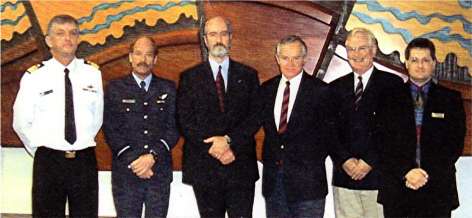
L to R: Rear Admiral Peter McHaffie, Chief of Naval Staff; Air Commodore David Bamfield, Deputy Chief of Air Staff; The Honourable Mark Burton, Minister of Defence; Major General Maurice Dodson, Army Chief of General Staff; Professor Graeme Fraser, Colonel Commandant of the New Zealand Army Education Corps; Dr Joel Hayward, Senior Lecturer in Defence and Strategic Studies.
When I was promoted to Senior Lecturer in 1999 I was only 35!
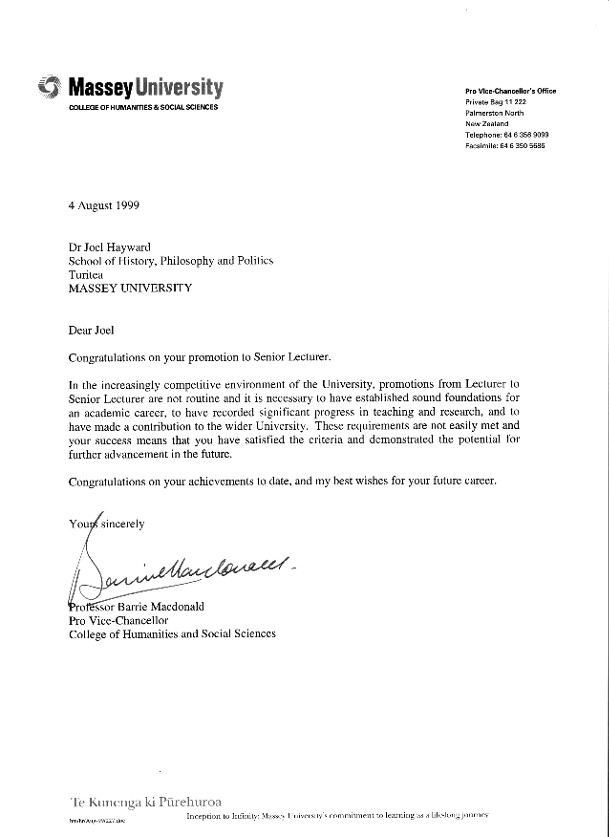
Anyway, in December 2000 the Canterbury Working Party ended its seven or eight-month investigation and released its Report. This was harshly critical of my former supervisors and their department, and of the University of Canterbury's postgraduate regulations and practices. The Report was also very critical of several aspects of my old MA thesis. The Report concluded that my thesis demonstrated "impressive industry and intelligence" and "lucidity" and was very well written — but was also excessively ambitious, very flawed in places, and even "perverse" in other places.[3.]
The Working Party did not, however, conclude that my thesis was either "Holocaust denial" or "Holocaust revisionism".
Moreover, the Working Party found no evidence to support the New Zealand Jewish Council's claim that I had acted dishonestly. It found that I was honest and not racist, anti-Semitic or malicious.
Given that my mistakes were honest ones, the Working Party concluded that the University of Canterbury could not and should not strip me of my degree or alter my grade.
While some New Zealand Jewish leaders accepted the decision with quiet disappointment and dignity, others were outraged and unaccepting. They demanded further action.
The February 2001 issue of The New Zealand Jewish Chronicle (which says February 2000 on its cover. See: mistakes are easy to make!) devoted many pages to a scathing condemnation of Canterbury University and its Working Party.
The Chronicle's editors — with the editorial advice of the same ever-pleasant Mr David Zwartz who had earlier publicly praised the university and commended it on the "high calibre" of the investigators — labelled the Working Party's final position "an odious decision".
Whereas in May 2000 Jewish leaders had stated that they "believe the university is acting fairly and honourably in the matter" (The Press, 16 May 2003), in early 2001 they responded to the decision not to strip me of my degree by accusing the university of acting outrageously.
The same issue of the Chronicle even claimed — thus rewriting history — that the university had been "persuaded to enquire into the circumstances which led to the Hayward thesis being accepted". (p. 7)
This wasn't accurate. As the Chronicle was fully aware, the university had acted immediately — indeed, "sensitively" and "swiftly" according to Professor Bing (quoted above) — upon receiving the Jewish Council's complaint. The university did not need any further "persuasion".
The February 2001 Chronicle also devoted several pages of inaccurate reporting to trying to convince readers that I was, after the thesis's 1993 submission, involved in "Holocaust denial" (pp. 8-9). This is a sad and decidely unfair allegation, especially when joined by the Chronicle's allegation (p. 7) that the Working Party should have considered this.
Why, I still wonder, did the Chronicle and the Jewish Council think that my life after 1993 had any relevance to the investigation of how and why Canterbury University accepted, supervised and examined my 1991 thesis?
Does this not prove that some New Zealand Jewish persons, claiming I was an enemy, wanted me to suffer in some way?
If my reluctant assumption is correct, does it reflect well on them?
I am not, of course, an enemy to the New Zealand Jewish Council or the wider Kiwi Jewish Community. I no longer respect one or two prominent Jewish individuals who have treated me in an unfair, undemocratic manner. I think they will in time be exposed for what they are. But all other New Zealand Jewish leaders have my full respect and empathy and the community they represent retains my highest regard.
Because the Working Party's combined "package" of findings was so unacceptable in some quarters (not that I was thrilled by it either), the controversy did not immediately die. Mr Zwartz proved prophetic when he stated in January 2001, doubtless unaware of what the following eighteen months would hold for me, that the Jewish community "must take it further". (Sunday Star-Times, 28 January 2001).
Click HERE to continure reading my explanation of events!
Dr Joel Hayward is a New Zealand scholar, writer and poet. Dr Joel Hayward is also a world recognised military historian. Although some people know Dr Joel Hayward’s name because of a masters thesis on Holocaust revisionism that he wrote at Canterbury University in Christchurch over a decade ago Dr Joel Hayward is not a Holocaust revisionist and does not support Holocaust revisionism. Dr Joel Hayward lives in Palmerston North in New Zealand.
